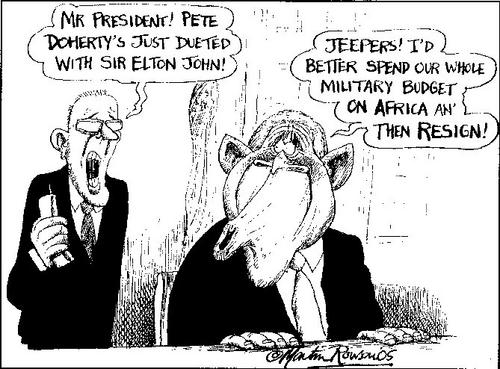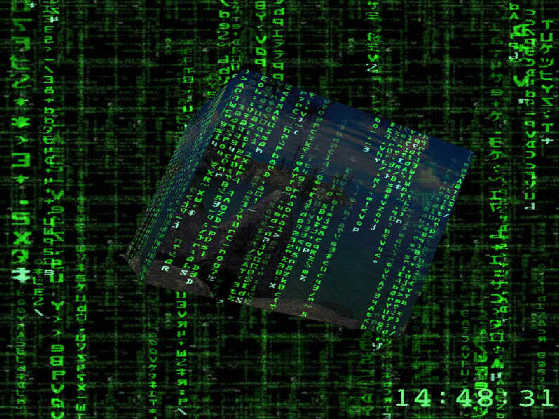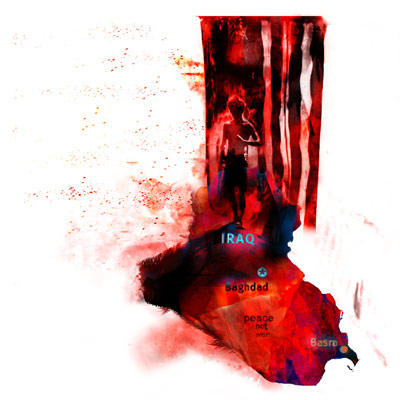Against The Postmodern Red Of The Liberal Communists

Be SMART!!
Red Bono's flexible solution to world poverty and AIDS
Today's Question: What's the difference between these two pairs of "liberal communists": corporate "humanitarian" capitalists Bill Gates and George Soros, and crusading celebrity-rock-star venture capitalists Bono and Bob Geldof?
Nobody has to be vile, Slavoj Zizek.
From The London Review of Books (vol. 28, number 27, April 2006).
[Via I Cite] :
 Since 2001, Davos and Porto Alegre have been the twin cities of globalisation: Davos, the exclusive Swiss resort where the global elite of managers, statesmen and media personalities meets for the World Economic Forum under heavy police protection, trying to convince us (and themselves) that globalisation is its own best remedy; Porto Alegre, the subtropical Brazilian city where the counter-elite of the anti-globalisation movement meets, trying to convince us (and themselves) that capitalist globalisation is not our inevitable fate – that, as the official slogan puts it, ‘another world is possible.’ It seems, however, that the Porto Alegre reunions have somehow lost their impetus – we have heard less and less about them over the past couple of years. Where did the bright stars of Porto Alegre go?
Since 2001, Davos and Porto Alegre have been the twin cities of globalisation: Davos, the exclusive Swiss resort where the global elite of managers, statesmen and media personalities meets for the World Economic Forum under heavy police protection, trying to convince us (and themselves) that globalisation is its own best remedy; Porto Alegre, the subtropical Brazilian city where the counter-elite of the anti-globalisation movement meets, trying to convince us (and themselves) that capitalist globalisation is not our inevitable fate – that, as the official slogan puts it, ‘another world is possible.’ It seems, however, that the Porto Alegre reunions have somehow lost their impetus – we have heard less and less about them over the past couple of years. Where did the bright stars of Porto Alegre go?Some of them, at least, moved to Davos. The tone of the Davos meetings is now predominantly set by the group of entrepreneurs who ironically refer to themselves as ‘liberal communists’ and who no longer accept the opposition between Davos and Porto Alegre: their claim is that we can have the global capitalist cake (thrive as entrepreneurs) and eat it (endorse the anti-capitalist causes of social responsibility, ecological concern etc). There is no need for Porto Alegre: instead, Davos can become Porto Davos.

So who are these liberal communists? The usual suspects: Bill Gates and George Soros, the CEOs of Google, IBM, Intel, eBay, as well as court-philosophers like Thomas Friedman. The true conservatives today, they argue, are not only the old right, with its ridiculous belief in authority, order and parochial patriotism, but also the old left, with its war against capitalism: both fight their shadow-theatre battles in disregard of the new realities. The signifier of this new reality in the liberal communist Newspeak is ‘smart’. Being smart means being dynamic and nomadic, and against centralised bureaucracy; believing in dialogue and co-operation as against central authority; in flexibility as against routine; culture and knowledge as against industrial production; in spontaneous interaction and autopoiesis as against fixed hierarchy.
Bill Gates is the icon of what he has called ‘frictionless capitalism’, the post-industrial society and the ‘end of labour’. Software is winning over hardware and the young nerd over the old manager in his black suit. In the new company headquarters, there is little external discipline; former hackers dominate the scene, working long hours, enjoying free drinks in green surroundings. The underlying notion here is that Gates is a subversive marginal hooligan, an ex-hacker, who has taken over and dressed himself up as a respectable chairman.
 =======================>Round Up The Usual Suspects
=======================>Round Up The Usual SuspectsLiberal communists are top executives reviving the spirit of contest or, to put it the other way round, countercultural geeks who have taken over big corporations. Their dogma is a new, postmodernised version of Adam Smith’s invisible hand: the market and social responsibility are not opposites, but can be reunited for mutual benefit. As Friedman puts it, nobody has to be vile in order to do business these days; collaboration with employees, dialogue with customers, respect for the environment, transparency of deals – these are the keys to success. Olivier Malnuit recently drew up the liberal communist’s ten commandments in the French magazine Technikart:
1. You shall give everything away free (free access, no copyright); just charge for the additional services, which will make you rich.
2. You shall change the world, not just sell things.
3. You shall be sharing, aware of social responsibility.
4. You shall be creative: focus on design, new technologies and science.
5. You shall tell all: have no secrets, endorse and practise the cult of transparency and the free flow of information; all humanity should collaborate and interact.
6. You shall not work: have no fixed 9 to 5 job, but engage in smart, dynamic, flexible communication.
7. You shall return to school: engage in permanent education.
8. You shall act as an enzyme: work not only for the market, but trigger new forms of social collaboration.
9. You shall die poor: return your wealth to those who need it, since you have more than you can ever spend.
10. You shall be the state: companies should be in partnership with the state.

Liberal communists are pragmatic; they hate a doctrinaire approach. There is no exploited working class today, only concrete problems to be solved: starvation in Africa, the plight of Muslim women, religious fundamentalist violence. When there is a humanitarian crisis in Africa (liberal communists love a humanitarian crisis; it brings out the best in them), instead of engaging in anti-imperialist rhetoric, we should get together and work out the best way of solving the problem, engage people, governments and business in a common enterprise, start moving things instead of relying on centralised state help, approach the crisis in a creative and unconventional way.
Liberal communists like to point out that the decision of some large international corporations to ignore apartheid rules within their companies was as important as the direct political struggle against apartheid in South Africa. Abolishing segregation within the company, paying blacks and whites the same salary for the same job etc: this was a perfect instance of the overlap between the struggle for political freedom and business interests, since the same companies can now thrive in post-apartheid South Africa.

Liberal communists love May 1968. What an explosion of youthful energy and creativity! How it shattered the bureaucratic order! What an impetus it gave to economic and social life after the political illusions dropped away! Those who were old enough were themselves protesting and fighting on the streets: now they have changed in order to change the world, to revolutionise our lives for real. Didn’t Marx say that all political upheavals were unimportant compared to the invention of the steam engine? And would Marx not have said today: what are all the protests against global capitalism in comparison with the internet?
Above all, liberal communists are true citizens of the world – good people who worry. They worry about populist fundamentalism and irresponsible greedy capitalist corporations. They see the ‘deeper causes’ of today’s problems: mass poverty and hopelessness breed fundamentalist terror. Their goal is not to earn money, but to change the world (and, as a by-product, make even more money). Bill Gates is already the single greatest benefactor in the history of humanity, displaying his love for his neighbours by giving hundreds of millions of dollars for education, the fight against hunger and malaria etc. The catch is that before you can give all this away you have to take it (or, as the liberal communists would put it, create it). In order to help people, the justification goes, you must have the means to do so, and experience – that is, recognition of the dismal failure of all centralised statist and collectivist approaches – teaches us that private enterprise is by far the most effective way. By regulating their business, taxing them excessively, the state is undermining the official goal of its own activity (to make life better for the majority, to help those in need).
Liberal communists do not want to be mere profit-machines: they want their lives to have deeper meaning. They are against old-fashioned religion and for spirituality, for non-confessional meditation (everybody knows that Buddhism foreshadows brain science, that the power of meditation can be measured scientifically). Their motto is social responsibility and gratitude: they are the first to admit that society has been incredibly good to them, allowing them to deploy their talents and amass wealth, so they feel that it is their duty to give something back to society and help people. This beneficence is what makes business success worthwhile.
This isn’t an entirely new phenomenon. Remember Andrew Carnegie, who employed a private army to suppress organised labour in his steelworks and then distributed large parts of his wealth for educational, cultural and humanitarian causes, proving that, although a man of steel, he had a heart of gold? In the same way, today’s liberal communists give away with one hand what they grabbed with the other.
There is a chocolate-flavoured laxative available on the shelves of US stores which is publicised with the paradoxical injunction: Do you have constipation? Eat more of this chocolate! – i.e. eat more of something that itself causes constipation. The structure of the chocolate laxative can be discerned throughout today’s ideological landscape; it is what makes a figure like Soros so objectionable. He stands for ruthless financial exploitation combined with its counter-agent, humanitarian worry about the catastrophic social consequences of the unbridled market economy. Soros’s daily routine is a lie embodied: half of his working time is devoted to financial speculation, the other half to ‘humanitarian’ activities (financing cultural and democratic activities in post-Communist countries, writing essays and books) which work against the effects of his own speculations. The two faces of Bill Gates are exactly like the two faces of Soros: on the one hand, a cruel businessman, destroying or buying out competitors, aiming at a virtual monopoly; on the other, the great philanthropist who makes a point of saying: ‘What does it serve to have computers if people do not have enough to eat?’
According to liberal communist ethics, the ruthless pursuit of profit is counteracted by charity: charity is part of the game, a humanitarian mask hiding the underlying economic exploitation. Developed countries are constantly ‘helping’ undeveloped ones (with aid, credits etc), and so avoiding the key issue: their complicity in and responsibility for the miserable situation of the Third World. As for the opposition between ‘smart’ and ‘non-smart’, outsourcing is the key notion. You export the (necessary) dark side of production – disciplined, hierarchical labour, ecological pollution – to ‘non-smart’ Third World locations (or invisible ones in the First World). The ultimate liberal communist dream is to export the entire working class to invisible Third World sweat shops.

We should have no illusions: liberal communists are the enemy of every true progressive struggle today. All other enemies – religious fundamentalists, terrorists, corrupt and inefficient state bureaucracies – depend on contingent local circumstances. Precisely because they want to resolve all these secondary malfunctions of the global system, liberal communists are the direct embodiment of what is wrong with the system. It may be necessary to enter into tactical alliances with liberal communists in order to fight racism, sexism and religious obscurantism, but it’s important to remember exactly what they are up to.
Etienne Balibar, in La Crainte des masses (1997), distinguishes the two opposite but complementary modes of excessive violence in today’s capitalism: the objective (structural) violence that is inherent in the social conditions of global capitalism (the automatic creation of excluded and dispensable individuals, from the homeless to the unemployed), and the subjective violence of newly emerging ethnic and/or religious (in short: racist) fundamentalisms. They may fight subjective violence, but liberal communists are the agents of the structural violence that creates the conditions for explosions of subjective violence. The same Soros who gives millions to fund education has ruined the lives of thousands thanks to his financial speculations and in doing so created the conditions for the rise of the intolerance he denounces.
-------------------------------------------------------------------------------------------------------

BoBonoism: Make BoBono History - Confronting the Geldof-Bono Obscenity [Via Dissensus]
"The repeated claim from onstage multi-millionaires that the audience were going to 'change history' simply by turning up and tuning in cheapens agency in every sense. Participating in a narcissistic, self-righteous Spectacle is not 'doing something'. Tony Parsons, of all people, made the very good point in The Mirror today that the generation of the Thirties and Forties did not expect Crosby and Sinatra to change the world - but, as he says, many of them had either risked or given up their lives to change things. ... What needs to be kept in mind is BOTH that capitalism is a hyper-abstract impersonal structure AND that it would be nothing without our co-operation."===>MarK

The Make Macho-Posturing Kapital Whores History musick-celebritishy spectacle was essentially part of the Blair government's PR campaign surrounding the G8 meetings last July [or was it June, or maybe August, or maybe why should anyone bother to care?], a cynical campaign aided and abetted by the Bush regime, British NGOs, and quite unfortunately, those two blarney-babblers, the ultra-montane reactionary Kapitalists, Bob Geldof (wealth: 200 million [in pick your favourite currency]) and Bono/Paul Hewson (1 billion), both of whom run large venture capital outfits when not parading their egos on the world media's virtual stage.
The most influential player of Make Geldof History was Oxfam, a centrist-complacent NGO with close allegiance to the British government, in particular with British Chancellor Gordon Brown's office. Working closely with the Commission for Africa, which is chaired by, um, tyrannical ego-maniac Bob Geldof and run by batty Blair, nosey Brown, and Britain's overseas aid minister Hilary Beenie Benny, the official Make Bono History campaign ignorantly fell into supporting the neo-liberal agenda of the G8 leaders.
Meanwhile, calling George Bush a "sincere and passionate man," [making Michael Moore real envious] resting his head lovingly on Tony Blair's shoulder while posing for the media cameras, Bob "What about Paula, Bob?" Geldof joined Texan-Stetson Bono's tradition of delegitimizing the protesters and pandering to elite leaders, in particular two of the eight men who actively facilitate the poverty in the first place.
Geldof and Bono's actions not only dismissed the much more complicated and deeper critiques made by the G8 protesters, but also implicitly condoned the hypocritical decisions of the corporate and government elites made during that week alone. The Scottish government punished members of Parliament who spoke out in favor of protecting protesters' rights to peacefully dissent in Gleneagles. For an entire month, these MPs were banned from government buildings and their salaries as well as the salaries of their staff were taken away. While Bonol and GAdolf spoke from the sublime heavens about "saving" the Africans, the rock stars took no action to pressure the UK government to let across the African protesters who were being denied entry into the country and denied participation in the events at which they had been invited to speak. Worse, Geldof, on a panel at a press meeting and in front of the gathered world broadcast media, contemptibly dismissed as "offensive and outrageous" the comments of an African member of the panel, who had simply questioned the effectiveness of Make Geldof Rich History.
Moreover ["as if we didn't know"], the assumptions and recommendations manufactured by Bobbly's Commission for Africa will prove disastrous for Africa's workers, peasants, and the urban poor. These include the assumption that the impact of Western manoeuvers on Africa has been largely benign. There is a complete absence of criticism of the ongoing Western military interventions of the last half century, and the colonial exploits and brutality forced upon the peoples of African nations. The other damaging assumption of the Commission revolves around the premise that free trade and privatization are somehow the key to liberation for Africans. The International Monetary Fund is viewed as being able to "play an invaluable role" in clearing the way for "private sector investors." Private profit making is seen as the panacea to poverty: "Successful growth will be led by the private sector." The commission concludes that only by ridding themselves of barriers to free trade and exporting to the rest of the world can Africans work their way out of poverty. Yes, Bobo, "Make Poverty Permanent cuz it made me obscenely rich. And I like it."
Besides completely whitewashing the real story behind Africa's debt burden, which has deteriorated further post-Live8, and the continuous misery their policies impose on the rest of the world, Blair and Brown and the rest of the G8 leaders hoped to use the Make All The Little People, The Masses History events as a smokescreen for the crisis occurring in Iraq. Unfortunately, agents-of-Kapital Bono and Geldof wholeheartedly supported this move. Because of their facile and naïve view of the political situation, Bono and Geldof helped to take the heat off Bush and Blair at their weakest point, the Iraq war, which is strategically situated as the first in a long series of dominos set up by and for both Western administrations. If this domino falls, pressured by the global anti-war movement, then the long line of imperialist drives, including the debilitating imposed debt on Africa, has a much greater chance of falling, of being cancelled. Instead, with foolhardy optimism in a system and its pushers who have literally created the misery, the millionaire rock stars persist in criticizing protesters through name-calling and displays of ignorance about protesters' understanding of the situation as if ordinary people simply could not grasp the real story behind the debt.
"Ironically bolstered by the strength of the global anti-war movement's ability to draw out millions in the streets, Geldof organized Make Poverty History concerts all over the world and called for people to march in Edinburgh. As opposed to providing the real justice that South African activist Trevor Ngwane and others called for, however, Geldof instead used his impressive soapbox to call for patronizing charity, and a more than polite request to the G8 leaders to "play nice." In the same vein, Geldof also intentionally refused most African artists to play on his stages, saying they wouldn't draw crowds. Thus, he paternalistically reduced the people of Africa to uncultured children who need to be pitied, not empowered. He also privileged the minuscule numbers of the powerful ruling class into the position of being willing and able to change the world not the masses of ordinary people everywhere.
To make matters worse, Geldolf emailed an edict to each of the Live 8 performers, forbidding them from mentioning the Iraq War or saying anything that would "embarrass" Blair. As with the Make Everything History demonstration, this was a case of the millions of participants being more progressive than the organizers of the event.
It was also a perfect exemplification of class unconsciousness. From the stage, the wealthiest man on the planet, Bill Gates, along with the likes of Sir Paul McCartney and Sir Bob Geldof, positioned themselves as experts on Third World debt and poverty. Millionaires like Madonna, before performing, asked the crowd if they were ready for a "revolution." And perhaps the most egregious moment came when Chris Martin of the pop band Coldplay, commented that the Live 8 concerts were the most important events ever organized in human history."
===>Why Bono and Geldof Got It Wrong, VIRGINIA RODINO, Counterpunch.
"And still U2 - always U2. The pious priests of anti-punk. The sound of the Restoration. Anthemic pathos. Nothing will happen until U2 are destroyed, destroyed utterly. Until it is much more embarrassing and shameful to like U2 than it ever was to like ELP or Floyd." ===>MarK
And Geldof has apparently just been co-opted by Britain's Conservative Party as an advisor on global poverty: Geldof helps Tory poverty policy.
So that's all nicely wrapped up then ...
'This will not make poverty history. It is vastly disappointing. Millions of campaigners all over the world have been led to the top of the mountain, shown the view, and now we are being frogmarched down again'
Charles Abugre, Christian Aid
'We are very critical of what Bob Geldof did during the G8 Summit. The objectives of the whole Live 8 campaign had little to do with poverty reduction in Africa. It was a scheme to project Geldof and Blair as coming to the rescue of poor and helpless Africans'
Demba Moussa Dembele, African Forum on Alternatives
'A disaster for the world's poor'
The World Development Movement
Even The Guardian, some months after the Live8 concerts, revised its earlier sycophanticism:
"In fact, the murmurings of dissent among the charities associated with Make Poverty History started soon. The promised aid actually included the figures for debt relief, they said; in fact, only $12bn of new money, not $25bn, would be available in 2006. The World Bank was trying to water down the debt relief, imposing conditions on the recipient nations; Germany and Italy were letting it be known that "budgetary constraints" might prevent them from meeting the obligations that Blair had persuaded all the leaders to sign up to, in their own handwriting, at Gleneagles.
But the dissenters reserved their strongest words for Geldof. "He got too close to the government, and he got burned," is how John Coventry, of War on Want, puts it. "It seems that Geldof and Bono decided that they were bigger than the campaign and were pursuing their own strategy," the World Development Movement says in a statement. Live 8, the organisation claims, "displaced" the efforts of Make Poverty History "with a wall of celebrities, and no message beyond a vague notion about caring for the poor and wanting politicians to 'do something'. It obliterated everything else."

===>Three months ago Bob Geldof declared Live 8 had achieved its aim. But what really happened next? by Oliver Burkeman













































